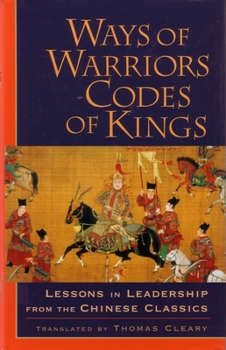Ways of Warriors, Codes of Kings: Lessons in Leadership from the Chinese Classics
Select Format
Select Condition 
Book Overview
Here is a concise and user-friendly presentation of the ancient Chinese principles of leadership and strategy in the words of the masters themselves. Thomas Cleary has put together this collection of... This description may be from another edition of this product.
Format:Paperback
Language:English
ISBN:1570625697
ISBN13:9781570625695
Release Date:May 2000
Publisher:Shambhala
Length:128 Pages
Weight:0.35 lbs.
Dimensions:0.4" x 5.4" x 8.4"
Customer Reviews
2 ratings
Ancient "lessons" which are still relevant to the modern business world
Published by Thriftbooks.com User , 17 years ago
I recently re-read this book and Donald G. Krause's The Book of Five Rings for Executives and will now share my current reactions to what Thomas Cleary characterizes as "lessons in leadership from the Chinese classics" he has selected: Master Wei Lao, The Book of Three Strategies, The Book of Six Strategies, The Warrior Code of the Charioteers, Wu Qi's Art of War, and Sun Tzu's Art of War. In his brilliant Introduction, Cleary notes that the rise of modern China on the international scene "has stimulated increased interest in Chinese civilization, particularly in the strategic and tactical lore so prized in the fields of statecraft, military affairs, and commerce." What Cleary offers is an anthology of selections translated from several famous works of classical Chinese strategic lore. "All are about human potential, for better or worse." Of special interest to me is how Cleary organized the material. Rather than merely provide the six primary texts in sequence, he wisely chose brief excerpts from them that speak to a specific topic or issue. For example, from Wu Qi's Art of War, advice as to "When to Avoid Conflict" with opponents who possess six advantages, such as having help readily available from neighbors all around and assistance from large countries. "If you do not match up to an enemy in these [six] respects, avoid them unhesitatingly." When I first read this anthology in 1999, I did not fully appreciate the relevance and value of at least material that - at that time -- seemed simplistic. I was wrong. I now view each of the brief excerpts as a "nugget" of insight concerning some aspect of the process by which to formulate and then implement an appropriate leadership strategy or tactic to achieve a desired objective. Although Sun Tzu's Art of War remains the best known and most frequently read source among the six that Cleary includes, all of the other five also offer much of interest and value. (I am unqualified to suggest the nature and extent of influence between and among the six.) Yes, their authors anchored their observations and admonitions in the context of military competition and, yes, there is always a danger of forcing correlations with commerce competition 2,000-2,500 years later. Clearly does not make that mistake because, I suspect, he trusts his reader to determine for herself or himself the relevance of each excerpt to the modern business world. Presumably many of those who read this book will be encouraged to read all or some of the primary sources (i.e. Master Wei Lao, The Book of Three Strategies, The Book of Six Strategies, The Warrior Code of the Charioteers, Wu Qi's Art of War, and Sun Tzu's Art of War) as well as Machiavelli's The Prince and/or Carl von Clausewitz's On War. I also high recommend several other books that Thomas Cleary has written, notably Mastering the Art of War, The Book of Leadership and Strategy, and Zen Lessons: The Art of Leadership. With regard to this last source, I conclude with one of
A wonderful book of codes to live by for modern day warriors
Published by Thriftbooks.com User , 23 years ago
This is a terrific book! It's a slim volume, only about 100 pages, but chock-full of wisdom from ancient Chinese leaders and kings. It's amazing to read through this book and see how much is still pertinent in today's world, especially the business world. There are principles from six classic sources: Master Wei Lao; The Book of Three Strategies; The Book of Six Strategies; The Warrior Code of the Cavaliers; Wu Qi's Art of War, Sun Tzu's Art of War.Topics covered include everything from warfare to statesmanship, governance to strategy, leadership and teamwork. Each writer has their own section, and there is a long table of contents in the beginning which lists each piece in the order in which they are presented. This book would make a great gift for any student of strategy, be they businessperson or merely scholar.




